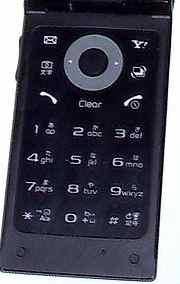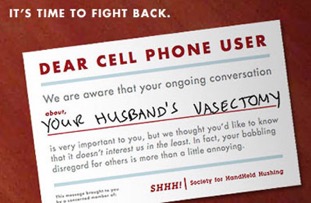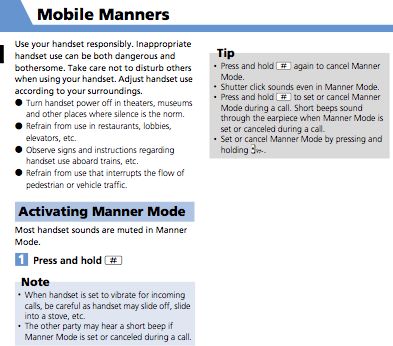Cellphones and Interpersonal Friction
Yet if you ask many people, they consider certain aspects of cellphone use obnoxious. This hit the spotlight in the consideration of cellphone use in aircraft, Docket 04-435. Officially, that docket was terminated without a decision because “(t)he comments filed in response to the NPRM provide insufficient technical information on whether the use of cellular phones onboard aircraft may cause harmful interference to terrestrial networks.” But a quick review of the record shows that 8,123 comments were filed (a large number for EMC issues) and most of them they deal with other than electromagnetic interference issues. Here is a typical comment filed:
I heard on the radio that the FCC is considering allowing cell phone usage on planes. I most urgently beg you NOT TO DO THIS, in the interests of public safety.
I'm not talking radio signal interference. I'm talking the intolerable, high volume blatherings that already go on all around us, that are going to lead to horrible rage incidents. These day's it's impossible to get on a bus without at least one person hollering into their cell phone, invading the private space of everyone around them.
The AP article on the FCC’s rejection of the proposal was clear
Striking a blow for cell phone haters everywhere, a government agency on Tuesday said it will keep a rule in place that requires the divisive devices to be turned off during airline flights.The reasoning behind the decision was technical. But the avalanche of comments the Federal Communications Commission has logged from airline travelers have been nothing short of visceral.
More recently I have been helping the South Carolina Department of Corrections with the issue of possible cellphone jamming in prisons to prevent illicit use by inmates. It became clear that a major concern of the cell phone industry in this issue was not the prison issue but fear that jamming would happen in other places. At first I wondered why they thought this was likely. I can imagine hotels might like to jam cellphone so they can charge high rates on calls from your room’s phone. Thus they have a malicious profit motive. By why would anyone else want to jam cell phones?
For the same reason why people didn’t want them in aircraft in Docket 04-435: much cell phone use today is obnoxious.
Is there anything that can be done with “social engineering” concepts to reduce this problem? I have read in several places, including a Wikipedia piece, that the lack of “sidetone” in cell phones results in a desire to talk louder than normal as opposed to landlines which have sidetone. Perhaps readers with more experience in this area can confirm whether or not cellphones have sidetone and what are the technical issues involved.
I travel to Japan a lot and I notice there that cellphone use is not as obnoxious as in the US despite higher market penetration and more cramped conditions in urban areas. There are a lot of reasons, some of them cultural. But some of them include actions by the Japanese cellphone industry to facilitate social harmony.
Consider this excerpt from the manual for a cellphone sold in Japan. Note that it starts off with “Use your handset responsibly. Inappropriate handset use can be both dangerous and bothersome. Take care not to disturb others when using your handset”. Did you ever see such language in instructions for a US cellphone or in ads from a US carrier?

Who invented Manner Mode? I have not been able to find out definitively. It appears to have started as an NTT DoCoMo feature and was adopted by the other carriers, but I welcome any input on details or alternative explanations.
So are there incremental steps that can be taken in the US to decrease the interpersonal friction caused by cellphone use?
Wa - harmony






![Validate my RSS feed [Valid RSS]](valid-rss-rogers.png)

